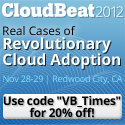 This week, VentureBeat hosted CloudBeat 2012 in Redwood Shores, California, where executives from VMware, Dropbox, Box, SAP, PepsiCo, Nebula, and many others provided deep insights about how people are using the cloud. CloudTimes was a Media Partner for the event.
This week, VentureBeat hosted CloudBeat 2012 in Redwood Shores, California, where executives from VMware, Dropbox, Box, SAP, PepsiCo, Nebula, and many others provided deep insights about how people are using the cloud. CloudTimes was a Media Partner for the event.
Cloud computing, a broader concept than it seems, is still fresh for many companies who sometimes distrust it. Yet it is an effective and dynamic deployment and still is in its infancy.
How Big Data Manages Large Volume of Data
Big Data is a technology that promises to revolutionize the way companies work with the information. It can cross different data sets from several independent sources for patterns, which enable companies to reach their target audiences with greater precision in time to launch marketing campaigns.
Bill Coughran, former vice president of engineering at Google, said he talked to dozens of companies that are collecting data as many texts, emails, reports and a host of material, but have no idea what to do with it yet. The problem is that working with these data is complex, and is a very sensitive topic. He said that Big Data means to connect with potential customers, start businesses and direct marketing correctly.
Cloud computing is delivering agility, cost savings and flexibility for businesses. Platform as a Service (PaaS) promises to take this to the next level by delivering big reductions in the time to market and cost of running cloud-based applications.
Appsecute, the company that bridges the divide between cloud and IT developers, unveiled the world’s first multi-platform management tools at the conference. Combining with PaaS tools that facilitate collaboration and visibility, Appsecute builds a ridge between IT and the business. Developers can perform the operations role as ‘DevOps’ for some systems, while handing over responsibility to IT for more mission-critical production systems.
Ken Stineman, senior director of enterprise architecture and security at Genomic Health, said companies are looking for more ways to harness the massive amounts of unstructured data.
“We are generating terabytes of data on the human genome,” he said. “With this data in hand, Genomic Health hopes to do things like improve the effectiveness of chemotherapy in cancer patients.”
Cloud Security is a Concern
HP senior security strategist Rafal Los, Qualys CTO Wolfgang Kandek, and CloudPassage chief security evangelist Andrew Hay talked about cloud security and emphasized every connected device and every electronic account you have should start using multi-factor authentication.
“Standard passwords are not secure,” CloudPassage’s Hay said. “Multi-factor authentication is the only solution that will be accepted by the mainstream.”
Qualys’ Kandek said every site and every service should use multi-factor authentication.
“It doesn’t have to start with enterprises or consumers. Personal users should be educated to use these tools. With enterprises, you’re assuming that the organization is going to know better than you when that may not be the case,” says CloudPassage’s Hay.
SaaS Apps Continues to Grow
Software-as-a-service apps continue to grow in enterprises. At the event, IT leaders talked about the goal to create data integration for cloud and core apps in an automated way.
Apigee is one company that provides applications programming interface (API) platform to cloud providers. Developers can write apps using the APIs to make the data flow back and forth.
“Apps were never built to be shared, and it’s like prying information out of folks who are unwilling to share it,” said Sam Ramji, vice president of strategy at Apigee.
SnapLogic has built an integration platform to allow data to flow across both apps and core systems located either in the cloud or in on-premise data centers. (See the exclusive interview with CEO Gaurav Dhillon from our CEO Series).
“You have dozens of APIs now, and everyone has a different idea of how data should be represented,” said Chris Wagner, chief technology officer at SnapLogic. “SnapLogic’s idea is to ride this wave of API technology and build a platform to allow people to integrate data and move it where it’s supposed to be.”
Hi Martin, great article on lessons learned! I was happy to see ‘Cloud Security’ as one of your focuses. Cyber Security was one of 2012’s biggest risks, with the malware, phishing, and numerous hacking attacks. I saw mention of the use of multi-factor authentication on all connected devices and electric accounts–probably one of the better approaches as of now.
Thanks, Jessica. Cloud Security is a major topic for us. The best way to follow it is here https://cloudtimes.org/category/security/